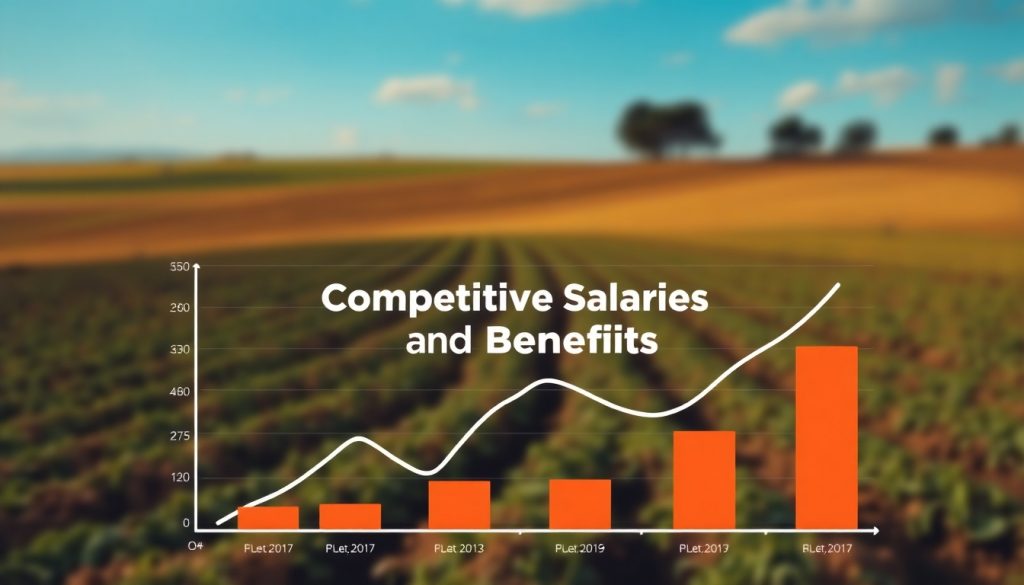10 Benefits of Job Growth for Agriculture Teachers in 2025
The agricultural sector is experiencing a profound transformation, driven by cutting-edge technologies, evolving consumer demands, and a heightened focus on sustainability. This shift has created an unprecedented demand for skilled agriculture educators, whose knowledge and leadership will be essential in preparing the next generation for the future of the industry.
By 2025, expanding career opportunities for agriculture teachers will not only enhance their professional growth but also play a critical role in advancing agricultural innovation, sustainability, and global food security.
Key Highlights
- Surging Demand: Agriculture education is a strategic priority, offering job security and growth opportunities.
- Innovation and Impact: Teachers drive agricultural innovation, sustainability, and community development.
- Diverse Career Paths: Opportunities extend beyond the classroom into corporate training, policy advising, and rural development.
- Competitive Compensation: Agriculture educators enjoy attractive salaries, benefits, and professional development resources.
1. Surging Job Demand and Unmatched Security

With agriculture education emerging as a global strategic priority, the demand for qualified educators is experiencing unprecedented growth. This surge not only underscores the critical role of agriculture teachers but also ensures exceptional job stability and security. In an ever-evolving and indispensable industry, educators are poised to build fulfilling, impactful careers, contributing to a sector that is vital for global sustainability and economic progress. With the rising demand for agriculture educators, now is the perfect time to explore career opportunities in this field. Check Agriculture Jobs to find the latest openings.
2. Pioneers of Agricultural Innovation

Agriculture teachers serve as catalysts for innovation, equipping students with the knowledge to address challenges like food insecurity, climate change, and resource management. By instilling cutting-edge skills, educators play a pivotal role in reshaping food systems and ensuring environmental resilience.
3. Expanding Career Horizons
The field of agriculture education offers a broad and dynamic range of career opportunities that extend well beyond traditional classroom teaching. These include:
- High School and Postsecondary Educators: Shaping the next generation of agricultural professionals by imparting knowledge and skills in high schools, vocational schools, community colleges, and universities.
- Extension Educators: Delivering essential resources, training, and support to rural communities and farmers, ensuring they have the tools to succeed in an evolving agricultural landscape.
- Corporate Trainers: Enhancing the capabilities of the workforce within agribusinesses by designing and delivering training programs that boost efficiency and foster innovation.
- Policy Advisors and Nonprofit Educators: Advocating for sustainable agricultural policies and leading initiatives at the grassroots and institutional levels to drive environmental and economic progress.
- Floral Designers and Horticulture Specialists: Combining artistic creativity with agricultural expertise to develop thriving floral businesses, event planning services, and sustainable plant cultivation practices. Agriculture teachers with expertise in job skills in floral design can guide students toward careers in floristry, greenhouse management, and eco-conscious design.
4. Competitive Salaries and Benefits

As the demand for agriculture educators escalates, compensation packages are becoming more competitive and appealing. In addition to attractive salaries, these positions offer comprehensive benefits such as premium health insurance, generous retirement plans, and dedicated funding for professional development.
With agriculture careers evolving, some specialized roles now offer the highest salary in agriculture jobs, making the field even more lucrative for those with expertise in education, research, and agribusiness. These incentives not only reflect the value of agriculture educators but also support their ongoing growth, ensuring they remain at the forefront of an industry in constant evolution.
5. Tangible Impact on Communities
Agriculture teachers serve as vital community leaders, championing sustainable practices and driving economic growth. Through their mentorship and hands-on education, they inspire students to become proactive agents of change, empowering them to transform local food systems, foster environmental stewardship, and contribute to the social and economic vitality of their communities.
By instilling a sense of purpose and responsibility, agriculture educators cultivate the next generation of leaders who are equipped to address global challenges and make a lasting, positive impact.
6. A Gateway to Lifelong Learning
The fast-evolving agricultural landscape provides boundless opportunities for professional growth. Agriculture teachers can engage in seminars, workshops, and research programs, allowing them to stay at the forefront of technological innovations and enhance their expertise in emerging trends, ensuring they continue to provide students with the most current and relevant knowledge.
7. Bridging Technology and Education

Modern agriculture education seamlessly integrates cutting-edge technologies like drones, GIS systems, data analytics, and biotechnology. This hands-on, tech-driven approach not only engages students but also equips them with the skills necessary to thrive in an increasingly digital and innovation-driven agricultural industry.
8. Champions of Sustainability
In the face of growing environmental challenges, agriculture teachers are at the forefront of promoting sustainable practices. By emphasizing conservation, resource management, and renewable technologies, they help students understand the critical role they play in fostering ecological stewardship, preparing them to tackle the world’s most pressing environmental issues.
9. A Profession of Purpose and Fulfillment

For agriculture teachers, their work goes beyond a job, it is a meaningful vocation rooted in a strong agriculture education teacher philosophy. By mentoring students, fostering innovation, and tackling global agricultural challenges, they play a pivotal role in shaping the industry’s future. Their philosophy is centered on hands-on learning, sustainability, and preparing the next generation for real-world agricultural advancements. The ability to inspire students while contributing to sustainable solutions gives their profession a profound sense of purpose, ensuring a lasting impact on both society and the environment.
10. Thriving Professional Networks
The agriculture education community thrives on collaboration and knowledge exchange. Teachers have access to a vast agriculture network that connects them with industry leaders, researchers, and fellow educators. Through professional organizations, industry conferences, and educational programs, they can share ideas, innovate curricula, and strengthen their collective impact. This dynamic exchange of knowledge ensures that agriculture educators stay informed about emerging trends and best practices, further enhancing their ability to shape the future of the industry.
The Future is Bright for Agriculture Teachers
The projected job growth in agriculture education by 2025 presents unmatched opportunities for educators to advance their careers, drive sustainability, and make a lasting impact on their communities. As agriculture remains the backbone of global economies and ecosystems, the increasing demand for skilled educators highlights their vital role in shaping future agricultural advancements.
By equipping students with essential knowledge and innovative solutions, agriculture teachers serve as the foundation of progress, fostering a legacy of resilience, sustainability, and industry transformation.
FAQs
What qualifications are required to become an agriculture teacher?
Most positions require a bachelor’s degree in agricultural education or a related field, along with a teaching certification. Advanced roles may demand a master’s or doctoral degree, depending on the level of instruction and responsibilities.
Why should I choose agriculture as my career path?
Agriculture offers a rewarding and impactful career, where you can address global challenges like food security, sustainability, and environmental conservation. Choosing a career in agriculture allows you to make a tangible difference, contribute to innovation, and be part of a growing, dynamic field.
What are the benefits of job growth for agriculture teachers?
Job growth for agriculture teachers brings unparalleled job security, competitive salaries, and career advancement opportunities. With the increasing demand for skilled educators, agriculture teachers can enjoy greater stability, professional growth, and the chance to impact the next generation of agricultural leaders.
How can I explore agriculture teaching job opportunities?
Job openings can be found on platforms like AgCareers.com, school district websites, and industry-specific associations such as the National Association of Agricultural Educators (NAAE).
What skills are essential for agriculture teachers?
Effective communication, adaptability, a passion for agriculture, technical expertise, organizational skills, and the ability to inspire students are all vital traits for successful agriculture educators.
Are there career advancement opportunities in agriculture education?
Yes, educators can advance into roles like curriculum developers, department heads, or agricultural consultants, or transition into industry or government positions within agriculture.
How does technology enhance agricultural education?
Tools like drones, precision agriculture systems, virtual simulations, and online learning platforms make learning interactive and prepare students for a tech-driven agriculture industry, giving them a competitive edge.
What role does sustainability play in agricultural education?
Sustainability is integral to the curriculum, focusing on conservation, renewable resources, and eco-friendly farming methods to address global environmental challenges and promote sustainable agricultural practices.
What extracurricular opportunities complement agriculture education?
Programs like FFA (Future Farmers of America), 4-H clubs, and supervised agricultural experiences (SAEs) offer hands-on learning, leadership development, and community engagement for students pursuing agricultural careers.
How do agriculture teachers impact local communities?
By promoting sustainable practices, supporting local food systems, and mentoring students, agriculture teachers strengthen community resilience and economic vitality, making a significant positive impact on local economies and environments.
What are the biggest challenges agriculture teachers face?
Key challenges include keeping up with rapid technological changes, securing funding for agriculture programs, and engaging a diverse student population with varying levels of interest and experience in agriculture.
Share this content:















Post Comment